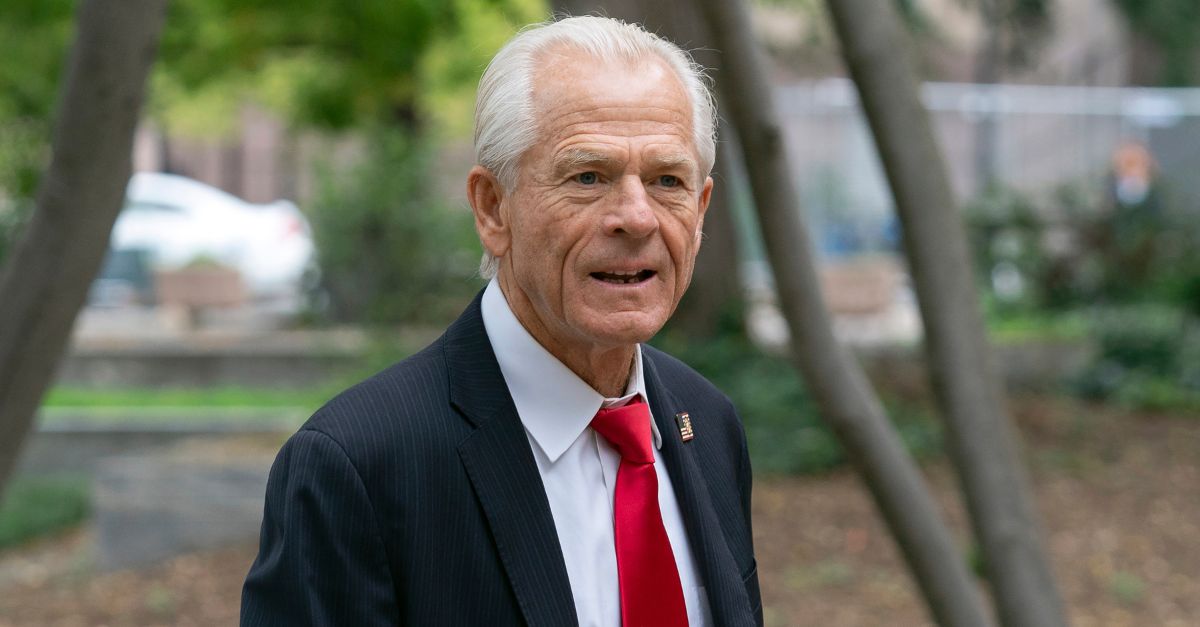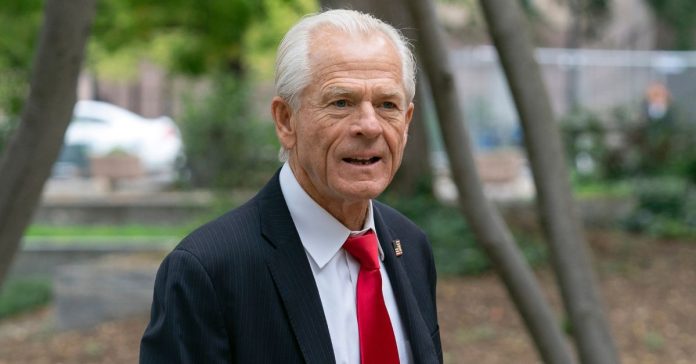
FILE – Former Trump White House trade adviser Peter Navarro arrives at the E. Barrett Prettyman U.S. Federal Courthouse, in Washington, Aug. 28, 2023. (AP Photo/Jose Luis Magana, File)
Federal prosecutors want an economic adviser to former President Donald Trump to spend half a year behind bars for refusing to cooperate with a subpoena from congressional investigators looking into the Jan. 6 attack on the U.S. Capitol.
Peter Navarro, who served as trade adviser during the Trump administration, was convicted in September of two counts of contempt of Congress for his failure to comply with a subpoena issued to him by the House Select Committee to Investigate the Jan. 6 Attack on the U.S. Capitol.
In a sentencing memo filed Thursday, government lawyers argued that Navarro “thumbed his nose at Congressional authority” from the start, and therefore should spend six months in jail.
“He cloaked his bad-faith strategy of defiance and contempt behind baseless, unfounded invocations of executive privilege and immunity that could not and would never apply to his situation,” the government’s memo says. “The Committee sought documents and testimony from the Defendant pertinent to a matter of national importance — the circumstances that led to the violent attack on the Capitol on January 6, 2021, and the disruption of the peaceful transfer of power. But the Defendant, like the rioters at the Capitol, put politics, not country, first, and stonewalled Congress’s investigation.”
“The Defendant chose allegiance to former President Donald Trump over the rule of law even after being apprised that executive privilege would not excuse his default,” prosecutors added.
Calling Navarro’s claims of executive privilege “unfounded,” prosecutors say the defendant had “forecasted his disdain” for the House committee investigating Jan. 6 and “decided to hide behind claims of privilege before even reviewing the subpoena” while claiming that Trump had asserted executive privilege over their communications.
U.S. District Judge Amit Mehta found, however, that “there was no invocation.”
“As the Court emphasized, the Defendant presented nothing — no words from the former President, no ‘smoke signal’ from any conversation nor anything conveyed by another — that would constitute an actual assertion of the privilege,” the government’s memo says. “The Court was left with only the Defendant’s fan fiction version of what the Defendant wished or hoped the former President might have wanted but left unsaid.”
Prosecutors requested six months for each of the two counts on which he was convicted, but noted that they “may be imposed concurrently.”
In his memo, also filed Thursday, Navarro pushed back on the government’s observation that the contempt statute has a one-month minimum jail sentence.
According to federal law, anyone convicted of contempt “shall be deemed guilty of a misdemeanor, punishable by a fine of not more than $1,000 no less than $100 and imprisonment in a common jail for not less than one month nor more than twelve months.”
Navarro argues that the statute does not require that he spend at least a month in jail.
“Dr. Navarro respectfully notes that the statute does not have a mandatory minimum term of imprisonment, and that the few prior convictions under the statute which should guide this Court have seen the respective defendants sentenced to probation despite being convicted under the statute,” the memo says.
The “common jail” referenced in the statute, for example, “no longer exists,” according to Navarro.
“The statute was enacted in 1857, before the formal existence of the Federal Bureau of Prisons and when no federal penitentiaries existed,” the memo says. One of the two jails that existed in Washington, D.C., at the time was later repurposed as a military prison, and the other was demolished to create space for what would become the building that houses the U.S. Supreme Court.
Navarro also cites examples of two cases — one in which a defendant pleaded guilty to the count, another where a “no contest” plea was entered — that resulted in zero time behind bars as punishment.
Navarro also pointed out that his appeal is pending, and said that “the only other recent sentence for contempt of congress” — that of Steve Bannon — was stayed pending appeal. As Law&Crime previously reported, Bannon was ordered to serve four months for his contempt of Congress conviction, and also for refusing to comply with a subpoena from the House Jan. 6 committee, although the judge in that case agreed to allow Bannon to remain out of jail as he appealed his case.
“Given the novel issues with which this Court was presented, any sentence imposed upon Dr. Navarro should be stayed pending the resolution of his appeal of the bevy of determinations the Court was required to reach in this case,” the memo says.
The ex-president’s aide also says that his prosecution was “motivated by political bias” and is “inextricably intertwined with the events of January 6, 2021.” He accuses prosecutors of trying to wrongly link Navarro to the siege at the Capitol in addition to the subpoena issue.
“[T]he trial of Dr. Navarro focused as much on the abhorrent events of January 6 as it did on Dr. Navarro’s decision not to comply with the subpoena in question,” the memo says (citations omitted). “Tellingly, the government sought to have the jury associate Dr. Navarro with domestic terrorists. The improper motive with which Dr. Navarro’s prosecution was pursued further compels a stay pending appeal of the novel legal issues presented by Dr. Navarro’s prosecution so that the Circuit can resolve (or affirm) these questions without political zealousness with which Dr. Navarro’s conviction was attained.”
Earlier this month, Mehta denied Navarro’s request for a new trial.
Have a tip we should know? [email protected]

